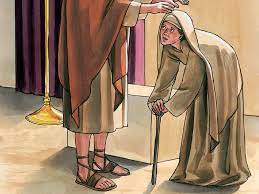Reflection: "The Sabbath" When I was growing up, Sundays meant church, family, and food.
Our family would all go to church on Sunday morning, with the kids attending Sunday School, while the adults did something boring - then we’d buy crusty bread rolls on the way home before sitting down to a meal of roast lamb. Sunday evenings meant the rest of the family would head off to church and youth group and it was my job to have the washing up done before they returned - which usually entailed a frantic, last-minute scramble from in front of the TV, when I heard their car in the driveway! Perhaps your families had similar ways of spending Sundays, and they might have involved church, family, and food, too - that was the norm back then. Perhaps some of you came from households where frivolous activities were even prohibited on Sundays. You might just have read the Bible on Sunday afternoons after church, maybe played quietly before it was time for the evening church service. Many of us can remember when the stores were closed on Sundays, salespeople having the day off and no business was transacted. All of these customs originated from people's ideas about how to obey the Third Commandment: "Remember the Sabbath day and keep it holy." From the time this commandment was given by God to Moses, there has been disagreement about why we should honour the Sabbath and how we keep it holy. The book of Exodus links Sabbath observance to creation: "For in six days the Lord made heaven and earth, the sea, and all that is in them, but rested the seventh day; therefore, the Lord blessed the Sabbath day and consecrated it." In Deuteronomy a different reason is given: "Remember that you were a slave in the land of Egypt, and the Lord your God brought you out from there with a mighty hand and an outstretched arm; therefore, the Lord your God commanded you to keep the Sabbath day." The Sabbath was meant to be a gift, a time of rest and restoration, a time to worship God. But quickly, that gift turned into Law, and all sorts of rules grew up about what was work and what wasn't, what was permissible to do on the Sabbath and what was not. Keeping the Sabbath holy also meant reserving that day for worship of God, and, as you might guess, people had various ideas about what constituted worship and, therefore, exactly what kept the Sabbath holy. Jesus and his disciples were constantly getting into trouble with the religious authorities for not properly observing the Sabbath. The issue comes up four times in the Gospel of Luke, and three of these involve healing on the Sabbath. In this week's reading, Jesus is teaching in a synagogue on the Sabbath when he notices a woman who is so crippled, that she’s completely bent over. She’s been suffering this way for 18 years. The woman doesn’t approach Jesus, nor ask for anything - she doesn't have to. The minute he sees her, he calls to her, lays his hands on her and says, "Woman, you are set free from your ailment." What Jesus does for the woman is to set her free from the torture and imprisonment of her own body. Jesus gives her a new life, free from pain, free from shame, free from isolation. Jesus restores to the woman her dignity, her sense of self-worth, her place in the community, and her very identity. No longer simply a cripple, she is, as Jesus calls her, a proud daughter of Abraham, heir of God's promise, and a participant in God's covenant. Jesus reaches out to this outcast, this woman whose everyday life is worse than death, touches her, and gives her the wholeness, health, and peace that God always intended people to have. And she didn't have to do anything - what Jesus does for the woman is a gift; it is pure grace. When Jesus touches the woman, she stands up straight and tall for the first time in 18 years and she begins to praise God, as she knows the source of her healing. Even on the Sabbath day, she praises God for this unexpected, wonderful, unbelievable gift of life. Not everyone, however, feels the same joy. The Leader of the synagogue can’t rejoice in this mighty act, nor thank God for it. He can only see that Jesus has worked on the Sabbath – something forbidden in the Jewish law. Rather than confront Jesus directly, however, he criticises the waiting crowd and tells them to go away: 'There are six days on which work ought to be done," he says; "come on those days and be cured, and not on the Sabbath day." But Jesus isn’t willing to let this slip by without raising an issue. He accuses the ruler of hypocrisy, because it was permissible for someone to untie an animal on the Sabbath to give it some water. Relieving the thirst of an animal, so that it can continue to live, is not a violation of the Sabbath. Why should relieving the suffering of a woman who has been tied up in knots for 18 years, so that she can live a full life, be any different? Is she of less worth than an animal? The Leader’s inconsistency, and his lack of understanding of God's will, are revealed to all. Luke reports, "The entire crowd was rejoicing at all the wonderful things that Jesus was doing”. Jesus demonstrated to the crowd that keeping the Sabbath holy was not about observing rules and all the "thou shalt nots" that the religious leaders had created. Keeping the Sabbath holy was about worshiping God by releasing people from bondage and giving them new lives, so that they, too, could praise God. That's what God had done for the Israelites when he led them out of Egypt, so, in a very clear way, by healing the crippled woman on the Sabbath, Jesus was keeping, not breaking, the third commandment. And that's the same thing that Jesus did for you and me when, out of love, he died on the cross and rose again, releasing all those who believe in him from the bondage of sin and giving them new lives. Like the bent-over woman, we didn’t even have to ask for this gift - it is pure grace. Having received the gift, we’re free to thank and praise God with so much enthusiasm, that crowds will join in. So how do we keep the Sabbath holy today? How do we worship God in the 21st century? The old ways in which we used to keep the Sabbath are long gone. On Sundays now, as well as attending church, we work, we shop, we play sports, or watch them on television, we do everything that we do on any other day. With our busy schedules, our desire to spend time with the family, and our focus on having as much fun and free time as possible, we struggle with honouring the Sabbath and using the day to worship God. Few of us would want to return to a world full of religious laws and strict rules about how to observe the Sabbath - even if we could. And, yes, it’s often tempting to join the throngs of people for whom Sunday is no different from any day. Yet, the very fact that we DO come to worship, says that we are looking for something more, that we are looking for ways to keep the Sabbath holy and to thank and praise God. As we gather together to tell and to hear the story of God's love for us, we experience that love, given to us in the form of Holy Communion, with the bread and the wine, which links us to God and to each other. Christians in every time and every place rejoice in the Lord's graciousness and meet to give thanks for the gifts provided to them by God. My belief is that we should definitely worship God and keep the Sabbath holy on Sundays, but not to the exclusion of all the other days of the week. God wants our attention and focus on the Kingdom at all times, not just on one special day of the week, so we need to also worship him in all we do during the rest of our weekly activities. You are blessed to be a blessing to others…………………Pastor Rick
1 Comment
Lena Beryl Blok
20/8/2022 10:11:23 am
Thank you again. Rick. This message brought back memories for me. Walking a mile to Church, home again, and Sunday School in the afternoon. I do believe that every day should be a Sabbath, when we worship God and praise Him for His great love and goodness.
Reply
Your comment will be posted after it is approved.
Leave a Reply. |
Pastor
|
LANE COVE
|
Worship Service:9:30am Sunday
© Lane Cove Uniting Church | 2020
|


 RSS Feed
RSS Feed